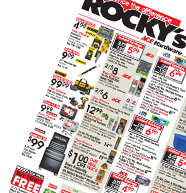As backyard swimming pools become more common, pool chemicals are being repackaged and re-merchandised for the consumer market. Manufacturers also provide information about their specific products. Consumers should be reminded to check recommendations and instructions carefully before using pool chemicals.
The addition of swimming-pool chemicals can round out an outdoor living department. However, you must carry the essential chemicals and supplies for complete pool maintenance, and you must be able to explain their uses to customers.
CARE CHEMICALS
Stabilized Chlorine – to sanitize the pool water. Sold in sticks, tablets, granular and liquid form.
Super-Chlorinators – or “shocker,” used at the opening of the pool or for extra sanitizing power.
Stabilizers – cyanuric acid used to minimize chlorine dissipation from sunlight.
Acid – muratic or sulfuric acid designed to lower the water’s pH. Sold in liquid or granular form.
Soda Ash – raises the water’s pH.
Mineral and Metal Adjusters – chemicals to prevent staining, equipment corrosion and scaling due to minerals and calcium in the water.
Algae Inhibitors and Algaecides – chemicals to prevent the growth of algae which causes a green tint to the water and a slippery film to form in the pool.
Water-Testing Kits – Test kits are designed to test for one specific chemical, or for a range of chemicals and pH balance, depending on the product. Test kits usually use chemically treated strips that turn color when exposed to pool water, or tables that turn the water colors to indicate the condition of the water. These chemicals should be used in proper sequence, which is 1) balance pH; 2) chlorination; and 3) shock or super chlorination. Missing the first step in this sequence can result in over-chlorination.
POOL ACCESSORIES
Along with pool chemicals, a diy pool care center needs pool brushes, extension handles and floats. Cross merchandise some other outdoor living goods with the pool items-patio accessories or deck furniture, for instance.
Check your state and local codes before starting any project. Follow all safety precautions. Information in this document has been furnished by the North American Retail Hardware Association (NRHA) and associated contributors. Every effort has been made to ensure accuracy and safety. Neither NRHA, any contributor nor the retailer can be held responsible for damages or injuries resulting from the use of the information in this document.

